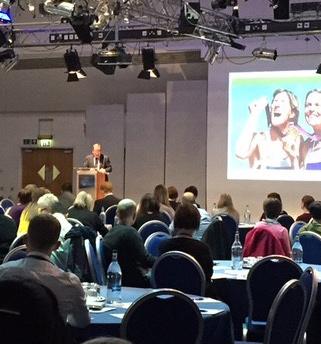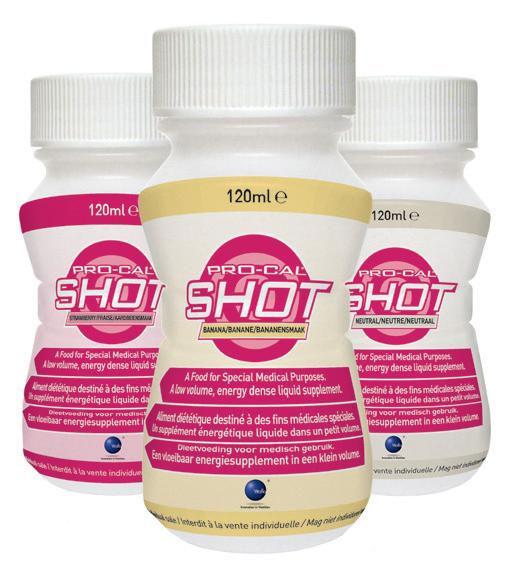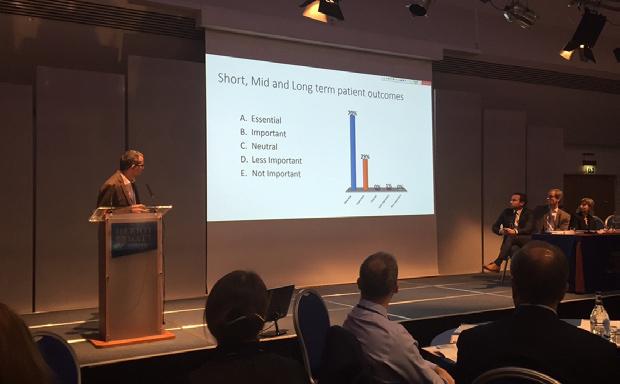
9 minute read
ERAS UK
erAS UK: ConferenCe rePort
dr fiona Carter eraS uK manager, South west Surgical training network cic
Advertisement
fiona is passionate about medical education, with over 20 years experience in the field.
a report on the 5th enhanced recovery after surgery society (uk) Conference held in edinburgh on 6th November 2015
The ERAS UK Conference organising committee were delighted to see 200 people gather in the James Watt Conference Centre of Herriot-Watt University in Edinburgh for our fifth UK Conference. Delegates had travelled from across Scotland, England, Wales and Northern Ireland to share their knowledge and experiences of enhanced recovery. This year, the Conference was chaired by Professor Ken Fearon, a consultant surgeon at the Western General Hospital and Professor of Surgical Oncology at Edinburgh University. Professor Fearon opened the Conference with a call for everyone to “move towards value based healthcare together”. He emphasised the important role that audit and research must play in the ongoing implementation and sustainability for ERAS programmes across the UK. The first session of the conference aimed to give us a reality check on the actual progress of ERAS across the UK in the last five years. Using the same reporting methodology as the Enhanced Recovery Partnership Programme (see www.gov.uk/ government/uploads/system/uploads/ attachment_data/file/215511/dh_128707. pdf for more details), volumes of specific procedures, mean and median length of stay (LOS) and the range of the mean LOS were presented. The data for primary hip and knee replacement, colectomy and excision of rectum, prostatectomy and bladder resection and abdominal and vaginal hysterectomy from 2009 to 2015. Tom Wainwright (Bournemouth University) discussed the data for England and illustrated the ongoing
figure 1: professor Ken fearon delivering the opening address.
improvements for some procedures and the wide variability in mean LOS, particularly for colorectal procedures and bladder resection. It was fascinating to compare this data with that from Scotland (presented by David McDonald, Whole Patient Flow Programme, Scottish Government) and from Wales (from Dr Rachael Barlow, Cardiff University), with similar issues highlighted for the same surgical specialties. A full report of this work will be published in the near future.
Before each of our conferences, ERAS UK undertakes an online survey of their members to canvas opinion on key issues. This year, our survey focused on research priorities and the role of ERAS nurses. The second half of our ‘reality check’ session was led by Angie Balfour (Western General Hospital) and Imogen Fecher-Jones (University Hospitals Southampton), who presented the outcomes of the survey on the ERAS nurse role. The main areas of responsibility reported by the 33 ERAS nurses who responded (37.1% of those invited to take part), were: 1 Data collection or audit 2 Patient education 3 Support throughout the pathway 4 Staff Education 5 Project management
table 1: oral presentations at the 5th eraS uK Conference
abstract title author/ Presenter institution Prize awarded
Self-medicating of over the counter analgesics for enhanced recovery programme Jan Jones poole hospital nhS foundation trust third pre-operative carbohydrate supplementation in patients undergoing lung resection: a pilot study tomoyo fujuwara golden Jubilee national hospital use of wound infiltration catheters for enhanced recovery in laparoscopic live donor nephrectomies tim brown belfast City hospital first does intracostal suture placement reduce postoperative pain in patients undergoing thoracotomy under paravertebral analgesia Sanjeet Singh golden Jubilee national hospital national implementation of enhanced recovery programme: anaesthetists opinion melanie tan royal free hospital Second
enhanced recovery programme for knee arthroplasty within the nhS navraj nagra oxford university Clinical academic graduate School
6 Pathway development 7 Pre-assessment 8 Post-operative support 9 Post-discharge follow up
The majority of the audit tools used are local databases, with a small number of staff using the Encare system (see www.encare.se/ for more details) or national/regional toolkits. Delegates were encouraged to tweet their thoughts during the session (#ERASUK). The survey respondents reported a very wide variation in pay band for ERAS nurses (from band 4 to band 8), with almost three quarters working on week days only and roughly half being the only ERAS nurse in their trust.
It should be stressed that the number of responses to the survey was relatively small and ERAS UK will send a second round of questions to this staff group, with the aim of gathering a more representative response. This session closed with an assurance that a reinvigorated forum would be established for ERAS nurses and those working in similar roles.
The morning break featured a poster walk with over 30 abstracts presented and three marketplace stands covering enhanced recovery for elderly care, nutritional aspects of ERAS and a discussion point for an ERASapp. There was also a trade exhibition from the conference sponsors: Medtronic, Deltex, Nutricia, Halyard Health, Vitaflo and MSD. The second conference session began with another presentation based on our pre-conference survey. Mr Nader Francis (ERAS UK Chair, Yeovil District Hospital) led an interactive voting session to determine the most important research questions related to enhanced recovery. The open text responses in the initial survey were categorised and the most frequent suggestions were used as the basis for the voting session: • Short, mid and long-term patient outcomes • Implementation of guidelines and protocols for each specialty • Optimal postoperative analgesia • Postoperative ileus • Fluid therapy within ERAS (including for high risk surgery) • Patient experience/satisfaction • Prehabilitation • Compliance and minimising variability • Data recording and sharing • ERAS in emergency surgery (including abdominal surgery) • ER for elderly care • Patient education/expectations
The full results of this session will be provided on the ERAS UK website (www.erasuk.org).
Six oral abstract presentations then followed, which displayed the wide variety of excellent work being undertaken in this field across the UK. Many of these presentations led to some interesting debate with the audience and on twitter (#ERASUK). The abstracts and authors are listed in Table 1.
Because nobody wants to be in hospital any longer than they need to be

A study of colorectal surgical patients demonstrated a decrease in postoperative hospital stay when using , a powdered carbohydrate loading drink TM mix, as part of an Enhanced Recovery Programme.1

TM
A further study of postoperative colorectal surgical patients found that shot® 55% in addition to normal dietary intake, and concluded that an improved total calorie intake in this patient group . 2

NEW 120ml
bottle
® representative or our Nutritional Helpline on: Tel: 0151 702 4937 Website:
1 Noblett S, Watson D, Huong H, Davidson B, Hainsworth P, Horgan A (2006) Pre-operative oral carbohydrate loading in colorectal surgery:A randomized controlled trial. Colorectal Disease: 8, 563-569. 2 Sharma, M., Wahed, S., O’Dair, G., Gemmell, L., Hainsworth, P., & Horgan, A. F. (2013) A randomised controlled trial comparing standard postoperative diet with low-volume high-calorie oral supplements following colorectal surgery. Colorectal Disease: 15, 885-891. A Nestlé Health Science Company
® Reg. Trademarks of Société des Produits Nestlé S.A.
Delegates were able to spend more time networking and looking at the posters during the lunch break, when the judging panel were also able to reach their decisions on the top three: 3rd poster prize went to Kirsty Fraser from NHS Greater Glasgow and Clyde for a poster on ‘A new frontier: establishing a QI framework for enhanced recovery following elective caesarean delivery, a Scottish Government pilot at the Princess Royal Maternity’. Ceri Rowlands from Yeovil District Hospital won the 2nd poster prize for a ‘Feasibility study of volatile biomarker detection of anastomotic dehiscence in colorectal surgery (VERDDICT)’. The 1st poster prize was awarded to Jessica Whibley from Royal Marsden NHS Trust for an abstract titled ‘A decline in the incremental shuttle walk test result following chemo is associated with an increased risk of postoperative complications’. Full details of all the abstracts presented at this conference are available on the ERAS UK website at: www.erasuk.net/ uploads/2/6/4/0/26401678/5th_eras_uk_conference_programme__low_res_.pdf The third conference session began with three contrasting presentations on different tools for audit of ERAS compliance. Professor Olle Ljungqvist (Chair of International ERAS Society, Orebro University Hospital, Sweden) gave an overview of the implementation programme that is recommended by the ERAS Society, which makes use of the Encare database. David McDonald (Scottish Government) then presented the national toolkit that has been developed for use in five surgical specialties in Scotland. The final presentation on this topic was from Christine Ball (Head of National Clinical Analysis and Specialised Applications Team, NATCANSAT), who described the toolkit developed for use in England as part of the Enhanced Recovery Partnership programme and discussed the possible future uses of this system and the stored data. Session three then moved on to an update on the current and forthcoming UK studies on Prehabilitation, presented by Professor Mike Grocott (University Hospitals Southampton). The potential impact of modifying lifestyle factors (smoking and alcohol cessation, diet and activity) in the preoperative period was emphasised and these messages made a big impact with the audience. Dr Elizabeth MacDonald (Western General Hospital) then presented a talk on some of the practical challenges

figure 2: mr nader francis leading the interactive voting session on research priorities.
with pre-operative optimisation, with particular focus on frail, elderly patients. The importance of utilising a comprehensive geriatric assessment in the pre-operative period was raised, with many of the delegates reporting their intention to look at this in more detail (in the conference feedback).
The final session of this one-day conference began with an overview of the latest advances in Pain Management from Jayne Balson (Western General Hospital). This talk examined the effect of optimal analgesia on post-operative mobilisation, fluid balance, gut function, return to normal diet and, ultimately, a good quality recovery. A multidisciplinary group of experts then took to the stage to discuss a series of tricky case scenarios with the audience. The initial section was led by Nader Francis and Angie Balfour and look at key stages in a typical recovery for a colorectal patient. The issues discussed included training of junior staff in ERAS, leadership and empowerment of ERAS nurses, the challenges of post-operative ileus and tackling negative attitudes in senior colleagues. Andrew Kinninmonth then presented a case scenario which illustrated long-term problems that can arise for knee replacement patients in an ERAS unit. After presentation of the poster and oral presentation prizes, Professor Fearon gave us a short summary of the day before closing the Conference.
With very positive feedback from the participants, this 5th ERAS UK Conference was felt to be a success and work now starts to prepare the next Annual Meeting in Wales on 4th November 2016. If you want to get involved in shaping the content of the next conference or present your own work, please get in touch via the website (www.erasuk.net) or email (contact@erasuk.org). Twitter @ERASsocietyUK #ERASUK








